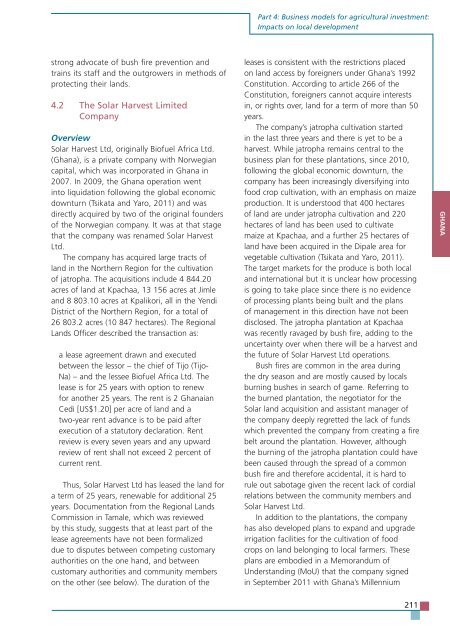TRENDS AND IMPACTS OF FOREIGN INVESTMENT IN DEVELOPING COUNTRY AGRICULTURE
TRENDS AND IMPACTS OF FOREIGN INVESTMENT IN DEVELOPING COUNTRY AGRICULTURE
TRENDS AND IMPACTS OF FOREIGN INVESTMENT IN DEVELOPING COUNTRY AGRICULTURE
You also want an ePaper? Increase the reach of your titles
YUMPU automatically turns print PDFs into web optimized ePapers that Google loves.
strong advocate of bush fire prevention and<br />
trains its staff and the outgrowers in methods of<br />
protecting their lands.<br />
4.2 The Solar Harvest Limited<br />
Company<br />
Overview<br />
Solar Harvest Ltd, originally Biofuel Africa Ltd.<br />
(Ghana), is a private company with Norwegian<br />
capital, which was incorporated in Ghana in<br />
2007. In 2009, the Ghana operation went<br />
into liquidation following the global economic<br />
downturn (Tsikata and Yaro, 2011) and was<br />
directly acquired by two of the original founders<br />
of the Norwegian company. It was at that stage<br />
that the company was renamed Solar Harvest<br />
Ltd.<br />
The company has acquired large tracts of<br />
land in the Northern Region for the cultivation<br />
of jatropha. The acquisitions include 4 844.20<br />
acres of land at Kpachaa, 13 156 acres at Jimle<br />
and 8 803.10 acres at Kpalikori, all in the Yendi<br />
District of the Northern Region, for a total of<br />
26 803.2 acres (10 847 hectares). The Regional<br />
Lands Officer described the transaction as:<br />
a lease agreement drawn and executed<br />
between the lessor – the chief of Tijo (Tijo-<br />
Na) – and the lessee Biofuel Africa Ltd. The<br />
lease is for 25 years with option to renew<br />
for another 25 years. The rent is 2 Ghanaian<br />
Cedi [US$1.20] per acre of land and a<br />
two-year rent advance is to be paid after<br />
execution of a statutory declaration. Rent<br />
review is every seven years and any upward<br />
review of rent shall not exceed 2 percent of<br />
current rent.<br />
Thus, Solar Harvest Ltd has leased the land for<br />
a term of 25 years, renewable for additional 25<br />
years. Documentation from the Regional Lands<br />
Commission in Tamale, which was reviewed<br />
by this study, suggests that at least part of the<br />
lease agreements have not been formalized<br />
due to disputes between competing customary<br />
authorities on the one hand, and between<br />
customary authorities and community members<br />
on the other (see below). The duration of the<br />
Part 4: Business models for agricultural investment:<br />
Impacts on local development<br />
leases is consistent with the restrictions placed<br />
on land access by foreigners under Ghana’s 1992<br />
Constitution. According to article 266 of the<br />
Constitution, foreigners cannot acquire interests<br />
in, or rights over, land for a term of more than 50<br />
years.<br />
The company’s jatropha cultivation started<br />
in the last three years and there is yet to be a<br />
harvest. While jatropha remains central to the<br />
business plan for these plantations, since 2010,<br />
following the global economic downturn, the<br />
company has been increasingly diversifying into<br />
food crop cultivation, with an emphasis on maize<br />
production. It is understood that 400 hectares<br />
of land are under jatropha cultivation and 220<br />
hectares of land has been used to cultivate<br />
maize at Kpachaa, and a further 25 hectares of<br />
land have been acquired in the Dipale area for<br />
vegetable cultivation (Tsikata and Yaro, 2011).<br />
The target markets for the produce is both local<br />
and international but it is unclear how processing<br />
is going to take place since there is no evidence<br />
of processing plants being built and the plans<br />
of management in this direction have not been<br />
disclosed. The jatropha plantation at Kpachaa<br />
was recently ravaged by bush fire, adding to the<br />
uncertainty over when there will be a harvest and<br />
the future of Solar Harvest Ltd operations.<br />
Bush fires are common in the area during<br />
the dry season and are mostly caused by locals<br />
burning bushes in search of game. Referring to<br />
the burned plantation, the negotiator for the<br />
Solar land acquisition and assistant manager of<br />
the company deeply regretted the lack of funds<br />
which prevented the company from creating a fire<br />
belt around the plantation. However, although<br />
the burning of the jatropha plantation could have<br />
been caused through the spread of a common<br />
bush fire and therefore accidental, it is hard to<br />
rule out sabotage given the recent lack of cordial<br />
relations between the community members and<br />
Solar Harvest Ltd.<br />
In addition to the plantations, the company<br />
has also developed plans to expand and upgrade<br />
irrigation facilities for the cultivation of food<br />
crops on land belonging to local farmers. These<br />
plans are embodied in a Memorandum of<br />
Understanding (MoU) that the company signed<br />
in September 2011 with Ghana’s Millennium<br />
211<br />
GHANA


